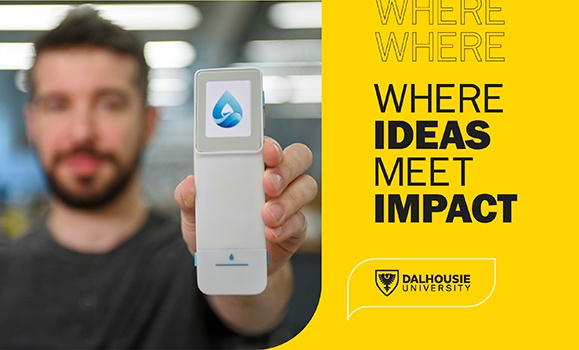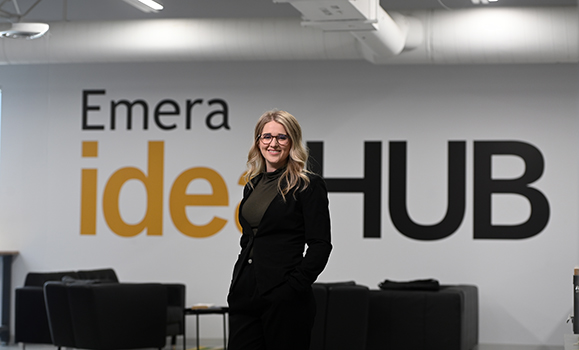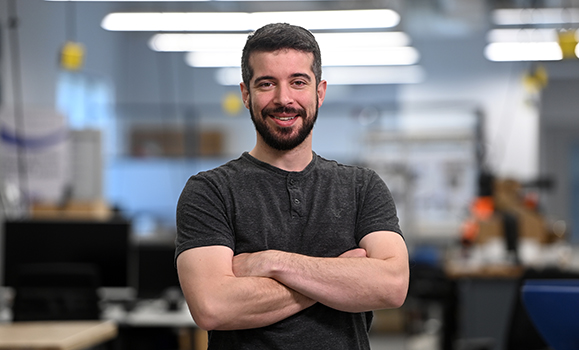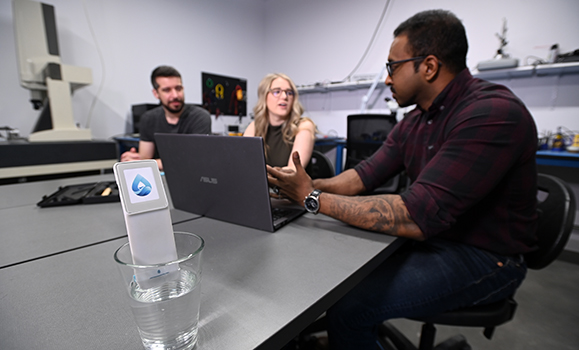The snapshot
Tech startup leveraged Dalhousie’sĚýĚýin its mission to transform consumer water testing with a handheld digital device that detects a wide range of toxic elements whose presence means the difference between safe and unsafe drinking water.
The ideaĚý
The concept behind Drinkable was developed four years ago by a trio of students taking part in the Atlantic Canadian Aqua Hacking Challenge. Their idea rested on the belief that existing testing methods are prohibitively complicated.
“A really big part of our technology is putting the power back in the consumer's hands and allowing them to have control over their water testing,” says Danielle Dey, the company’s chief technology officer and a Dalhousie mechanical engineering alumnus who joined the company shortly after its founding.
Standard well-water testing requires homeowners to obtain sample bottles and drop them back off at designated health or water authority locations or private labs. And sampleĚý, requiring multiple steps and time restrictions. As a result, many well users unnecessarily resort to drinking bottled water, or to drink unsafe, untested water.
“The research showed, unequivocally, that water testing was not performed enough for well users in Nova Scotia, and that’s a trend that carries through Atlantic Canada, North America, and the world,” says Matt Mizzi, one of the company founders and current CEO.Ěý
For instance, a study inĚýĚýfound that a mere 20 per cent of well owners across Alberta adhere to provincial testing guidelines. The study notes barriers, including the inconvenience and time-consuming nature of the testing process, and other factors.Ěý
Ěý
The Challenge
“A lot of people are taking risks they don't have to take, often unknowingly. The current testing and treatment process is really convoluted and confusing. So many people don’t test their water,” says Mizzi.
In Nova Scotia, chief among the risks is arsenic, which naturally occurs in the province’s groundwater. Exposure to arsenic in well water is associated with a range of adverse health effects, including skin and internal cancers. 51łÔąĎ 42 per cent of Nova Scotians rely on private wells, and it is estimated that one in five of these well users may have unsafe levels of arsenic in their untreated water. This is a situation that is replicated across Canada and around the world.Ěý
The Drinkable team wanted to create a testing device that was accurate, small, simple to use, and able to test for potentially harmful levels of arsenic, as well as well as a myriad of other contaminants, such as manganese, uranium, nitrate and lead, with the last in the list being a serious concern in Nova Scotia and urban and rural areas around the world.
“There was no simple, cheap, accurate way to test for those analytes. We wanted to make it easier to test, easier to understand the information from the test results, and easier to act on those results,” explains Mizzi, who holds a degree in environmental science from Acadia University.Ěý“More importantly than just detecting is that we can detect them below drinking water guideline safety levels, which is truly special.”
The Solution
The first test of Drinkable’s business concept came in the a 12-week accelerator offered by Dal Innovates the provides $10,000 in support and mentorship to transform research-based ideas into viable businesses. With a business plan in hand, they then turned to Dalhousie’s to turn their idea into a prototype. The 10-month program provided a $10,000 grant towards prototyping materials, and industry advisers who worked alongside them to validate and build their product’s first operational prototype.Ěý
They followed it up withĚý, a one-year residency program that aims to help tech ventures move from prototype to commercialization. They got dedicated desk space, work benches, 24/7 access, and support for all their technical and mechanical engineering needs, along with industry advisors.
They also leveraged support fromĚý, a program hosted at Dalhousie which aims to help science-based ventures scale-up their enterprises. The program linked the team with experienced and knowledgeable mentors, and helped the startup set realistic milestones to accelerate its progress.Ěý
“Dal's been a really great asset — a great resource of experts and knowledge,” Dey says.
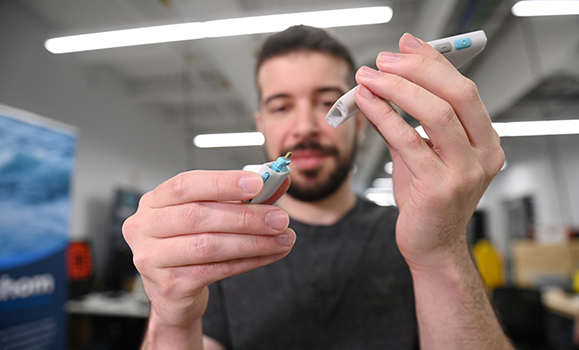
The result is the company’s hand-held unit containing detachable cartridges with sensor technology. But Drinkable’s technology is about more than detection; it’s also heavily focused on making the resulting information easy to understand. “It's not just about the sensor technology, it's about the delivery mechanism,” Dey says.
The units are simply placed into a glass of water, with the results displayed through the Drinkable app. “All the customer has to do is set it in a glass and press start,” Dey explains.Ěý
In other words, the goal was to blend hardware and software into one easy-to-use device. “We're really simplifying complex technology and complex ideas into a $175-solution,” says Mizzi. “It's an incredibly deep product. It's simple on the outside only because of the amount of work the technical team put in to making it.”
The Impact
To date, Drinkable has raised $310,000 in equity from Canadian angel investors. They've also made good use of local non-dilutive funding, such as $70,000 from the Atlantic Canada Opportunities Agency and a $25,000 investment after winning BioNova’s BioInnovation Challenge.Ěý
They are preparing to launch an initial run of 300 devices and have secured preorders for most. Initially, the focus is on well users but Mizzi charting a course toward a much bigger market, explaining, “We've got eyes on being a household name, beyond just the testing of wells. The market is big enough to build a unicorn company.”
That includes getting the technology into so many hands that Drinkable can start building a database of environmental conditions in real-time. “Imagine knowing every time a golf course is using an illegal amount of fertilizer or helping to identifying the source of an algal bloom on a lake,” Mizzi adds. “I think we’re going to be able to put really interesting stories together.”

